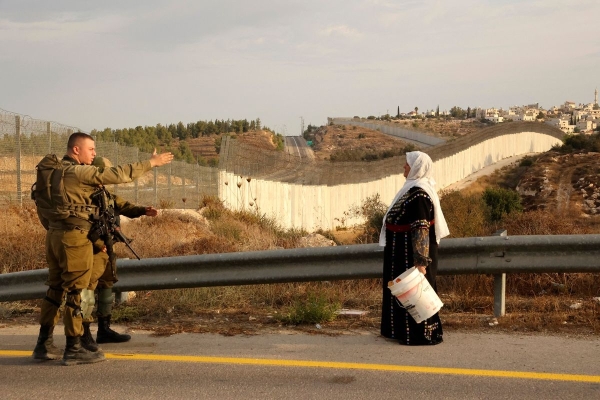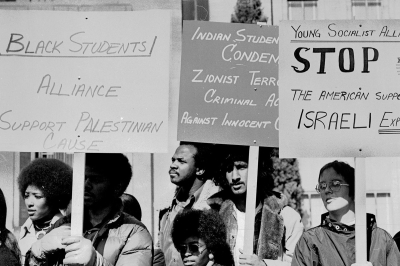The State of Israel has occupied the Palestinian territory of the West Bank, Gaza, and East Jerusalem since the 1967 war. The Palestinians living in those territories quite simply do not have the same rights as Israeli settlers there. For instance, it’s rare for the Israeli state to grant Palestinians building permits even as settlements expand.
Israeli leaders rarely articulate in clear terms that separate legal systems rule over Israeli settlers and Palestinians in the same area. To do so would be to recognize the split realities, which Palestinian, Israeli, and international human rights groups have documented as apartheid. But Israeli politicians have preferred to obscure this reality.
That is, until an incendiary settler-politician serving in the extreme-right Israel government caused a stir in Israel last week when he described the situation almost exactly as human rights groups have — not accidentally, as a slip of the tongue, but very much on purpose.
“My right, the right of my wife and my children to move around Judea and Samaria” — the biblical names for the West Bank — “is more important than freedom of movement for the Arabs,” National Security Minister Itamar Ben-Gvir told Israel’s version of Meet the Press. “My right to life comes before freedom of movement.”
“Sorry, Mohammad, but that’s the reality,” Ben-Gvir paused to say, turning to a member of the TV panel, journalist Mohammad Magadli, who is a Palestinian citizen of Israel.
It was a brash encapsulation of the policies underpinning Prime Minister Benjamin Netanyahu’s current far-right coalition, and even its softer and more PR-friendly predecessors.
Ben-Gvir justified the intensive security regime at a time of a growing grassroots Palestinian movement willing to violently resist the Israeli state, and as settler violence against Palestinians has spiked.
That clip quickly traveled around the internet. Ben-Gvir’s disparaging aside — “Sorry, Mohammad” — became a meme. One Israeli editor wrote that “Sorry, Mohammad,” would be a “fitting name for the Israeli national anthem.” The prominent Israeli human rights organization B’Tselem started posting violent videos and photos of the Israeli occupation captioned with the words “Sorry, Mohammad.” Some accounts began posting historical photos of racism and discrimination — from the Jim Crow years, apartheid-era South Africa and Nazi Germany — with those words. (Some posts appear to have been removed or deleted for violating social media terms of service.)
Because Ben-Gvir’s tone may have seemed provocative, but what he stated on TV is actually just the policy of the State of Israel.
The controversy over Ben-Gvir’s remarks, briefly explained
Ben-Gvir’s statement caused a backlash. The US State Department spokesperson condemned his remarks. And two days later, Netanyahu’s office weighed in on the social media platform X, formerly known as Twitter, to undo the damage.
“Israel allows maximum freedom of movement in Judea and Samaria for both Israelis and Palestinians,” the statement said. “Unfortunately, Palestinian terrorists take advantage of this freedom of movement to murder Israeli women, children and families by ambushing them at certain points on different routes.”
:no_upscale()/cdn.vox-cdn.com/uploads/chorus_asset/file/24881793/1193459317.jpg)
“This is what Minister Ben-Gvir meant when he said ‘the right to life precedes freedom of movement’,” the prime minister’s office went on to explain.
New grassroots Palestinian militant groups and individual acts of terrorism have increased this year. But it has also been an exceedingly deadly year for Palestinians in the West Bank. Under Netanyahu’s government, settlers have been emboldened, leading to more settler violence, the further annexation of Palestinian land, and settlement expansion. That encroachment has in turn fueled violent Palestinian resistance. This dynamic creates situations like one earlier this summer, when an Israeli military raid in Jenin killed 12 Palestinians, seemingly leading to a retaliatory Palestinian shooting of four Israelis near a settlement, which then led to more settler violence against Palestinians, all within three days.
Netanyahu, then, was not so much condemning Ben-Gvir’s policy stance as his tone.
Israeli attorney Daniel Seidemann pointed out that Netanyahu’s team posted on X on Friday evening after sunset, that is during the Jewish sabbath when Ben-Gvir and his colleagues from the Jewish Power Party would likely be offline. “He posted it only in English, not in Hebrew, so as not to anger his base,” Seidemann explained.
And when Ben-Gvir got online after sunset on Saturday, he stood by his comments. “Not only do I not regret my words, I am saying them yet again,” he said, with an Israeli flag behind him and Netanyahu’s official portrait sitting on the bookshelf.
Itamar Ben Gvir does not apologize for his Jewish Supremacist comments when he said that Jews rights are more important than Arabs’ rights. In fact he doubles down and repeats exactly what he said last night. Ben Gvir is a prize to BDS. pic.twitter.com/xEYTs6M4aB
— Josh Drill (@drill_josh) August 25, 2023
Amichai Eliyahu, Israel’s minister of heritage and a member of Ben-Gvir’s party, added another example to the genre on Sunday.
“As soon as someone threatens my rights to live, I slightly reduce his civil rights,” he said in a TV segment.
“Limit just a tiny bit?” TV anchor Attila Somfalvi responded. “It’s called apartheid, I think, in the dictionary.”
What Ben-Gvir’s comments really reveal
Ben-Gvir is not only any ordinary provocateur shaped by the racist ideology of the late Rabbi Meir Kahane. He is not just a lawyer who has represented Jewish terrorists who have killed Palestinians. He is a powerful minister in Israel’s far-right government.
Now he has laid plain what Palestinians endure every day. They lack rights so that settlers like Ben-Gvir can move freely through the occupied West Bank. Palestinians and Israeli settlers travel on separate roads in the territory; they are subject to different legal systems. “The elevation of Jewish rights to move (and most civil and human rights) over Palestinian freedom of movement (and other rights) is as old as the state itself,” Dahlia Scheindlin notes in the Israeli newspaper Haaretz.
Netanyahu has advanced a controversial overhaul of the Israeli judiciary that, among other issues, would enable policies of further annexation of Palestinian land. The ethno-nationalist partners in the governing coalition support such bureaucratic measures. In particular, the government’s recent moves of “transferring many powers overseeing the West Bank from military to civilian leaders—in contravention of international law,” as Israeli lawyer Michael Sfard notes, openly advance “a policy of unilateral annexation.”
In 2017, Bezalel Smotrich, now Netanyahu’s finance minister, published a radical manifesto entitled “Israel’s Decisive Plan” that advocates the expulsion of Palestinians who seek an independent state. His self-described “pragmatic document” also detailed how to further advance the settlements and illegal outposts, what he calls “Victory Through Settlement.”
For Palestinians, none of these comments come as a surprise. This is the reality of the occupied territories. But it’s somehow clarifying for Ben-Gvir to say them aloud — and shows that Netanyahu’s most extreme coalition partners are operating from a place of comfort.






